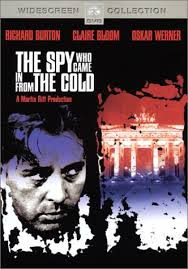
THE SPY WHO CAME IN FROM THE COLD is the victim of its many imitators. It seems today rather cliché: the disillusioned government operative, the brown raincoat, the double (or perhaps it’s a triple) cross, the drinking, the idea that everybody loses: so far, so spy novel. This is a literary world very familiar to me, because my father was a great reader, and a great lover of a certain kind of dog-eared paperback, and I am a veteran of my father’s bookcases. As my parents always let me read just what I pleased, the alcoholic double agent alone in his Berlin apartment was a relatively major feature of my early internal life (no wonder I have problems).
THE SPY WHO CAME IN FROM THE COLD only seems cliché today because it was so massively influential in its time. What it presented was shocking then: international affairs with no goodies and no baddies, and no victory possible. Today, this is the default position of virtually every high schooler; but at that time it was revolutionary, and the book has cast a long shadow over the spy novel ever since.
The story is focused on one Alec Leamas, who is a spy near the end of his career. The book does not quite reveal all to the reader, till right near the end, so I don’t want to spoil it for you; but essentially he accepts a mission which involves convincing the East Germans that he has been fired by MI5, and is now a disillusioned drunk ripe for turning. There a two wrinkles: one, that he actually is a disillusioned drunk ripe for turning, and two, that he falls in love. He travels to East Germany with his new communist handlers, and cross and double cross abound, drawing in his lady love, and ending in a sad non-victory on all sides.
The book is well written and keeps you guessing, and I enjoyed it. Here’s a sample: “The airport reminded Leamas of the war . . Everywhere that air of conspiracy which generates amongst people who have been up since dawn – of superiority almost, derived from the common experience of having seen the night disappear and the morning come.”
Curiously however what I most enjoyed was the Afterword, in which Le Carre talked about the process of writing the book. He was a quite unknown staffer in the secret service at the time: “I had been poor too long, I was drinking a lot, I was beginning to doubt, in the deepest of ways, the wisdom of my choice of job. The familiar process of embracing an institution, then fighting my way clear of it, was taking over my relationship to my marriage and my work”
He was just thirty years old, and interestingly he rapped the book out in just six weeks, the dark world of the novel reflecting his dark internal state. The book was a massive success, and changed his life overnight: “My marriage broke up, I went through most of the withdrawal symptoms that fame instills in writers, even if they pretend it doesn’t. I found a new wise wife and put myself together . . .But of course I will never forget the time when a disgusting gesture of history coincided with some desperate mechanism inside myself, and in six weeks gave me the book that altered my life”
I found it all rather an interesting insight into how one bumbles into life change.

It seems like there should be a word for that experience (the Germans probably have one) where the cultural influence of a work makes that work seem cliched when you finally encounter it. That was my experience of Romeo and Juliet, and Edgar Rice Burroughs' John Carter books among others.
It's sort of a sad problem, isn't it? Like when world monuments (pyramids and such) seem less impressive in real life than they did on TV!